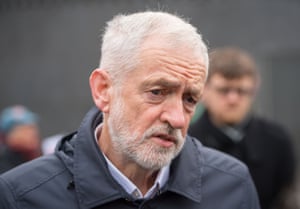While Corbyn Fiddles.......
If Parliament rejects the Prime Minister's bad deal - the only sensible course of action is to withdraw Article 50 immediately.— Sadiq Khan (@SadiqKhan) January 6, 2019
People from every corner of our country continue to call for the British people get the final say - with the option to stay in the EU. 🇪🇺 pic.twitter.com/43B2Hk5Oyg
Corbyn is so deluded he thinks his personal views on Brexit are more important than the rest of the Labour Party put together.
What a tosser!
Corbyn, Labour and Brexit (06/01/19)

The latest YouGov opinion poll on Brexit suggests that the Labour Party will be a very heavy price, if Jeremy Corbyn continues to support the Tories in their mad rush to leave the EU - despite the lack of support for Theresa May's deal or crashing out of Europe on the basis of 'No Deal'.
The 'Corbyn Effect' can also be seen in the latest Britain Elects poll on Westminster voting intentions which has the Conservatives opening up a 6 point lead.
It has to be said that any opposition worth its salt should clearly be streets ahead of what is widely regarded as the weakest Westminster government in modern history.
 @britainelects
@britainelectsCON: 40% (-1) LAB: 34% (-5) LDEM: 10% (+3) GRN: 4% (-) UKIP: 4% (+1)
Read the details of the full YouGov poll in the following link to The Guardian.
https://www.theguardian.com/politics/2019/jan/05/brexit-corbyn-electoral-catastrophe-yougov-poll

If Corbyn backs Brexit, he faces electoral catastrophe
The biggest Brexit survey yet shows Remain ahead – and Labour losing by a landslide in a general election if it does not oppose leaving the EU
Peter Kellner - The Observer
Ihave seldom seen a poll on a subject dividing the nation for which the lessons are so clear. The biggest survey yet conducted on Brexit shows that Remain would comfortably win a referendum held today – and that Labour would crash to a landslide election defeat if it helped Brexit go ahead.
YouGov questioned more than 25,000 people between 21 December and last Friday. It tested two referendum scenarios. If the choice is Remain versus the government’s withdrawal agreement, Remain leads by 26 points: 63% to 37%. If the choice is Remain versus leaving the EU without a deal, Remain wins by 16 points: 58% to 42%.
The difference is explained by the views of those who voted Leave in 2016. Many of them want a clean break with Brussels, but back away from an agreement that fails to redeem the promise in 2016 to “take back control”. Among all voters, only 22% support the government’s deal. Among Leave voters the figure is not much higher: 28%.
The larger point is that the nature of the choice has changed since 2016 – 52% voted Leave when it was a general aspiration with little apparent downside. Today support for Brexit is significantly lower when Leave is more clearly defined.
This pattern is familiar to referendums in different countries: many people support the broad idea of change, but back away when the details are laid out. They want “change”, but not “this change”.
That is clearly the case today: 80% of people who voted Leave two years ago still say they want Brexit to go ahead; but the figure falls to 69% if the choice is a “no deal” Brexit, and only 55% if the referendum offers the withdrawal agreement. The rest say they don’t know, or switch to Remain. (The respective loyalty rates on the other side – Remain voters in 2016 who would stick with Remain today – are significantly higher.)
In short, the electorate is increasingly polarised between a growing majority that wants the UK to stay in the EU and a much smaller, but still significant, segment of the electorate that wants a hard, “no deal” Brexit. There is little public appetite for compromise between these two positions.

Labour leader Jeremy Corbyn outside Kings Cross station in London last week on Labour’s “rail action day”. Photograph: Dominic Lipinski/PA
This polarisation poses acute problems for Jeremy Corbyn as well as Theresa May. The Labour leader fears that if his party backs a public vote and then campaigns for a Remain victory he will alienate Leave voters in Labour’s heartlands.
YouGov’s figures suggest that, far from boosting Labour’s support, Corbyn’s approach could lead to electoral catastrophe.
The conventional voting intention question produces a six-point Conservative lead (40% to 34%). This is bad enough for an opposition that ought to be reaping electoral dividends at a time when the government is in crisis.
However, when voters are asked how they would vote if Labour failed to resist Brexit, the Conservatives open up a 17-point lead (43% to 26%). That would be an even worse result than in Margaret Thatcher’s landslide victory in 1983, when Labour slumped to 209 seats, its worst result since the 1930s.
The key reason for this is that, if Labour is seen to facilitate Brexit in any form, YouGov’s results indicate that the party would be deserted by millions of Remain voters – without gaining any extra support from Leave voters.
Thus Labour risks losing Remain seats where the party did well in 2017 – famously Kensington and Canterbury, but also a host of other constituencies in and around London, and others with a large student population – while failing to recoup any of the ground it lost in the party’s traditional heartlands.
In 2016 Labour voters divided two to one in favour of staying in the EU. Today Labour voters divide 83% to 17% if the choice is Remain versus the Withdrawal Agreement, and 80% to 20% in a Remain versus “no deal” contest. There are huge and obvious risks in being seen to thwart such huge majorities – either by resisting a referendum or, if one is held, failing to campaign against Brexit.
Peter Kellner is the former president of YouGov.

